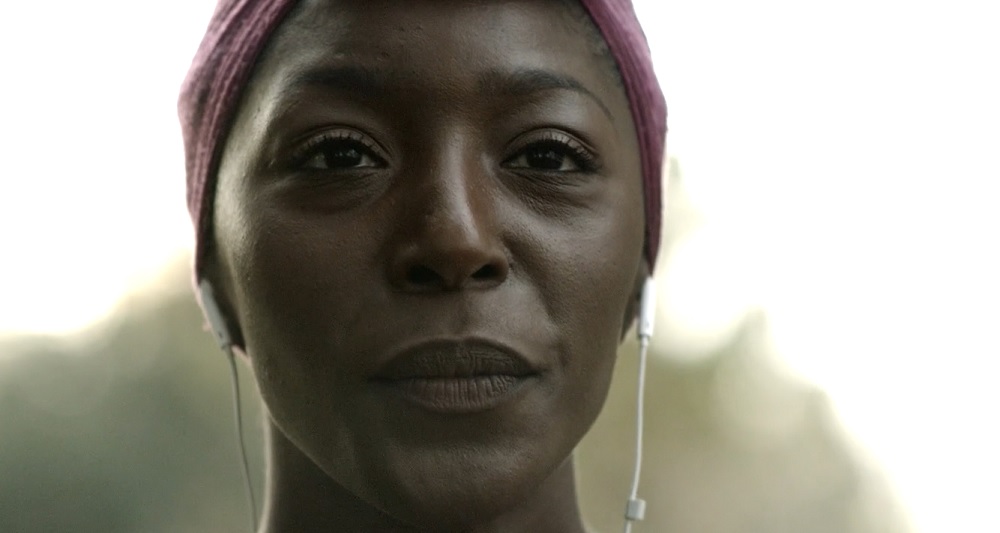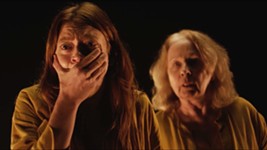Now Streaming in Austin: 'An Uncomfortable Woman
New short film makes perpetual unease the villain
By Richard Whittaker, 5:00PM, Thu. Feb. 3, 2022
There's an old saying: just because you're paranoid, doesn't mean they're not out to get you. In Meghan Ross's short, "An Uncomfortable Woman," that half-joke, half-warning becomes the spur for a quietly disturbing depiction of what it is to be perpetually in mild terror.
Ross had a viral success with her New Yorker short comedy, voice by Jon Hamm, "If You Ever Hurt My Daughter, I Swear to God I'll Let Her Navigate Her Own Emotional Growth." However, her new short takes a darker twist.
It stars Robin Beltrán as Dylan, a woman at constant unease in all social situations. Her best friend, the recklessly outgoing Lisa (Haley Alea Erickson) is determined to drag her pal out of her shell, but what she sees as mere reticence has much more disturbing roots and ramifications.
Austin Chronicle: Your earlier works, especially for the New Yorker, have had a satirical edge but "An Uncomfortable Woman," like many darker comedies, almost plays like a horror. What drew you to making something with this kind of tone?
Meghan Ross: This was the first short film I made, and it’s definitely symbolic of that time in my life, when I was learning how to cope with trauma through my comedy. Similarly to the protagonist’s mother, my Aunt Dawn (who was like a second mother to me) had suddenly passed away 7 months after I moved to Austin (and 1 week after I totaled my car), and I’d never experienced a level of grief like that before.
I was also consuming a lot of dark comedies at the time, like Search Party, and wanted to use both comedy and this close-to-horror tone to convey the anxiety that a woman who’s Going Through It experiences on a day-to-day basis.
AC: The short does a very powerful job of depicting what it's like to be a woman, constantly on guard around men, and how exhausting it is. For men, it might be a lesson, and some women may feel some sense of recognition. Were those differing reactions a factor in how you told the story?
MR: At the time that I made this, I was more focused on showcasing relatable scenarios a lot of women go through, from being told they’re overreacting and need to calm down, to the fear of something bad happening as soon as they do feel comfortable enough to let their guard down. Looking back, I was definitely still figuring out how to leverage my writing and filmmaking as a form of social commentary for all to engage with. But I’ve learned since then how to do so in a more subtle way, because I realized if you’re just hitting people over the head with the message you’re trying to tell them, they’ll be turned off and tune out.
My goal currently is for my comedy to be able to achieve that in a way that’s more accessible than miserable – for those who’ve experienced these types of situations, as well as those who’ve never noticed that an entire portion of the population deals with this all the time.
MR: The original casting call was for Dylan to be played by a woman of color, of any ethnic background. I’m Middle Eastern, and all of my scripts tend to feature an Arab woman protagonist (since it’s something I grew up never seeing), but I kept our casting specs broader, because I knew the lead would be able to shape the character even more, based on being a member of a different marginalized community herself.
Most importantly, I wanted to break the trope we always see in TV and film of the protagonist being white and the person of color exclusively being there to support the white person’s storyline. Robin Beltrán was a standout during auditions, and brought her own lived experiences and ways of coping with trauma as a Black woman to this role that distinguished the level of microaggressions her character faces.
AC: Your two central figures seem to be at polar opposites when it comes to that central theme. Who do you identify more with, Lisa or Dylan?
MR: I’m a Dylan who wishes she was a Lisa, but really, I think Dylan is so much stronger than I was in handling my own grief. The parts of me that are most Dylan include a previously-constant fear that something terrible is going to happen every day (thank you, antidepressants; no thank you, anxiety and OCD), but also being able to cope with that through sarcasm and humor.
I’m sure Lisa has her share of undiagnosed mental illnesses that we didn’t have enough time to dive deep into, but I wanted to utilize this ridiculous, seemingly care-free hometown friend as an outlet for the tension throughout the film. And also selfishly, to get to watch Lisa’s Haley Alea Erickson make us all laugh until we cried at 1 a.m. on set.
A note to readers: Bold and uncensored, The Austin Chronicle has been Austin’s independent news source for over 40 years, expressing the community’s political and environmental concerns and supporting its active cultural scene. Now more than ever, we need your support to continue supplying Austin with independent, free press. If real news is important to you, please consider making a donation of $5, $10 or whatever you can afford, to help keep our journalism on stands.
May 16, 2025
Now Streaming in Austin, An Uncomfortable Woman, Meghan Ross









